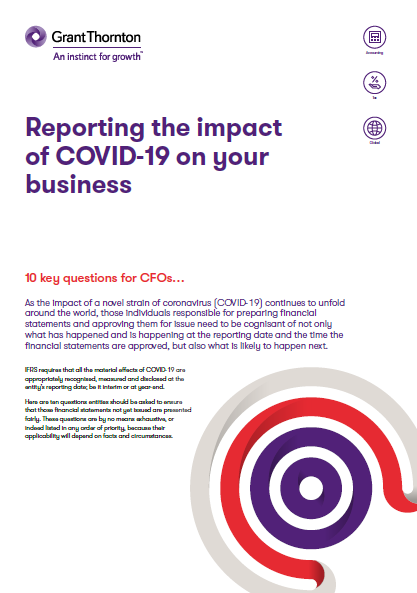-
Deals Services
The financial advisors of Grant Thornton offer customized solutions to their clients through personalized methods and services.
-
Technology
Our goal is to redefine how clients do business. With expertise in digital strategy, AI, data insights, and automation, we create personalized solutions to…
-
Strategy and Investments
The Strategy and Investments department supports businesses at strategic, operational and financial level.
-
Environmental, Social, Governance, Risk & Compliance
In the current business and regulatory environment, businesses aspire to meet today's requirements effectively, and to create value on sustainable terms.

-
Audit Services
The dedicated staff of Grant Thornton provide you with audit services such as financial statements for your business by using the HORIZON methodology.
-
Business Growth Advisory
At Grant Thornton, we recognize the need to align financial data with regulatory change, as well as the requirement for accurate financial data and consulting…

-
Corporate Taxation
Grant Thornton's tax professionals offer Corporate Taxation Services to provide advice and solutions to any issues your business may have.
-
Corporate tax compliance
The Grant Thornton corporate tax compliance specilaists possess long experience in both multinationals and Greek companies in all business sectors.
-
International tax services
Grant Thornton supports all businesses operating at the European and international level with advice on international tax matters.
-
Transfer pricing
Grant Thornton offers comprehensive pricing policy planning and tax audit support for domestic, multinational and corporate tax executives.
-
Tax Controversy
Grant Thornton provides tax audit and risk services because tax disputes are unavoidable in numerous businesses.
-
Private Client Services
In case you are an individual, Grant Thornton provides services like tax returns, transfer of wealth to future generations and expatriate taxation services
-
Indirect taxes
Learn more from Grant Thornton about our services for indirect taxes such as real estate taxes, customs, VAT and stamp duties.
-
Tax restructuring
Grant Thornton provides tax advisory services to companies undergoing tax restructuring or a change in their strategic direction.
-
Diagnostic Tax Review
Diagnostic tax review is a tax service offered by Grant Thornton to assist your organisation in identifying and assessing potential tax exposures.
-
Tax efficient supply chain planning
Get informed about tax efficient supply chain planning and how to improve your company's productivity model by reorganizing your productivity activities.
-
Global mobility strategy
In a globalized world, businesses must work seamlessly across borders. Organizations operate in multiple countries and view international expansion as a…

-
Accounting & Tax Compliance Services
Transferring non-core, yet important, activities outside the company and assigning them to specialists - external partners (Business Process Outsourcing) is the best…
-
HR & Payroll services
Grant Thornton provides specialized services in payroll management and human resources management for any type of company.

-
Banking
Grant Thornton has a dedicated financial services team that provides banking services such as tax and…
-
Insurance
Here you will find all the financial assurance services that Grant Thornton can offer to your…
-
Asset management
In Grant Thornton, asset management is a business approach that concerns assurance and…
-
Central Government
Grant Thornton provides services to central government agencies to respond immediately and…
-
Public Corporations and Organizations
Grant Thornton supports Public Enterprises and Organizations to evaluate their operations and…
-
Local Government
Grant Thornton and its qualified employees offers audit and consulting services to support local…
-
NSRF Managing Authorities and Special Services
Grant Thornton's specialized team of executives provides Technical Assistance services for the…
-
Public Health Services
Grant Thornton includes experienced professionals whose aim is to provide integrated services at all levels of…
-
Social Security Services
The public sector division of Grant Thornton provides high quality audit and advisory support services to…
-
Banking
Banking & Securities
-
Insurance
Insurance
-
Asset management
Asset management
-
Central Government
Grant Thornton provides services to central government agencies to respond immediately and…
-
Public Corporations and Organizations
Grant Thornton supports Public Enterprises and Organizations to evaluate their operations and…
-
Local Government
Grant Thornton and its qualified employees offers audit and consulting services to support local…
-
NSRF Managing Authorities and Special Services
NSRF Managing Authorities and Special Services
-
Public Health Services
Grant Thornton includes experienced professionals whose aim is to provide integrated services at all levels of…
-
Social Security Services
The public sector division of Grant Thornton provides high quality audit and advisory support services to…
-
Hotels & tourism services
Hotels & tourism services
-
Transportation
Transportation
-
Information Technology
Information Technology
-
Media
Media
-
Telecommunications
Telecommunications
As the impact of a novel strain of coronavirus (Covid-19) continues to unfold around the world, those individuals responsible for preparing financial statements and approving them for issue need to be cognisant of not only what has happened and is happening at the reporting date and the time the financial statements are approved, but also what is likely to happen next.
In "Reporting the impact of Covid-19 on your business", we highlight ten questions entities should be asked to make sure that those financial statements not yet issued are presented fairly. These questions are by no means exhaustive, or indeed listed in any order of priority, because their applicability will depend on facts and circumstances.
Everything CFOs need to know:
- Covid-19 – the big picture: what should be included in financial statements that have not yet been authorised and approved for issue?
- Will the outbreak of Covid-19 result in more disclosures?
- There has recently been a significant drop in the value of equities so if you have a 31 December 2019 reporting date, should your financial statements be adjusted for this?
- If there is estimation uncertainty, what should be reported in the financial statements?
- How does information about Covid-19 that becomes available after the reporting date affect the financial statements?
- Is it reasonable to take the view 'the more uncertain the environment, then more detailed disclosures of the assumptions and assessments used to prepare the financial statements should be made'?
- When assessing expected credit losses (ECL), what should be taken into consideration?
- What should be taken into consideration when determining fair values at a reporting date?
- How much attention needs to be given to going concern for Covid-19?
- Ultimately, what impacts of Covid-19 will the users of the financial statements be most interested in?
Find the answers to these questions in this publication. IFRS requires that all the material effects of Covid-19 are appropriately recognised, measured and disclosed at the entity’s reporting date; be it interim or at year-end.







